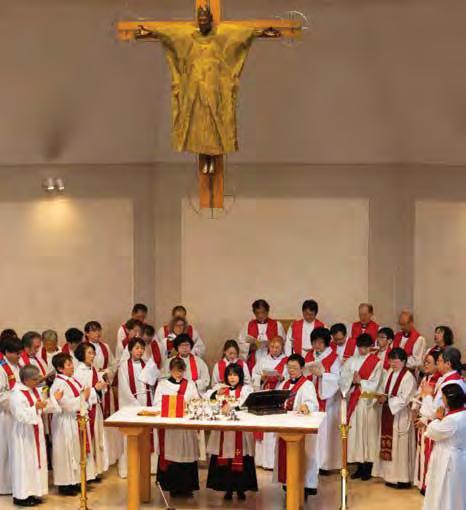
2 minute read
A Small but Patient Flock
from USPG Koinonia Issue 5 2/2021
by USPG
By Anna Tomie Kaneko.
The mission of the Anglican Church of Japan began in 1859. 139 years later, and following over ten years of persistent campaigning, the 1998 General Synod amended the statutes allowing women to be ordained as priests. In December that same year, the first female priest was ordained. Today, however, only 22 of the 199 current clergy are women: still less than 10% of the total. Moreover, there remain male clergy opposed to women’s ordination. A commission has been established at provincial level, to deal with this issue.
Three of the 22 clergy delegates to the General Synod are currently women (13.6%); nine of the 22 lay delegates are women (40%), and none of the 11 bishop delegates are women. In the Global Gender Gap Report 2020 published by the World Economic Forum, Japan ranked 121 out of 153 countries in the world, and it can be assumed that such social trends are reflected in the Church. The NSKK set a numerical goal at its 2013 Mission Consultation to increase women participants in decision-making bodies to 30% over the next 10 years until 2022. With the establishment of the Gender Working Group at the 2002 provincial synod and the Women's Desk at the 2006 synod, momentum to resolve gender issues and promote women's activities has been growing. The two groups interact with each other, create PR magazines, hold study sessions, and disseminate information. In 2006 and 2013, an ‘Anglican Women's Conference in Japan’ was held to share issues that need addressing so women themselves can become missionary agents. These bodies have been actively involved in identifying Japanese delegates for UNCSW since 2005 and promoting such activities as the ‘16 Days Campaign against Gender Violence’, including awareness of the SDGs, as well as collaborating with NGOs seeking equality for women and girls, and submitting proposals to the government. Christians make up 1% of the population of Japan and are a minority in society, thus sometimes we wonder what impact we can have. But from the perspective of women in the Church, the desire for gender equality in society is strong. Over the past three years, the ratio of male to female seminarians has been about half, showing the results of hard work and prayer; and giving hope for the future. The Gender Working Group and the Women's Desk have requested seminaries teach about gender equality as part of their theological education. We may be a small flock, but the Anglican Church in Japan has patience and passion, and the grace and energy to support it. I believe that with this, and following the world’s trends, we can promote greater gender equality. ■











